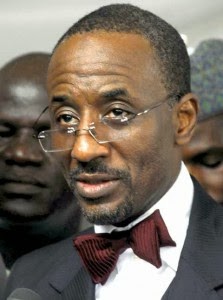The Governor of the Central Bank of Nigeria (CBN), Sanusi Lamido Sanusi has insisted that the Nigerian National Petroleum Corporation (NNPC) had no right retaining $10.8 billion oil revenue, saying it contributed to the drop in savings “that left the nation exposed to possible price shocks.”
Sanusi who spoke in an interview with Bloomberg in Abuja, Friday, said: “Given where the oil price is, we should have more in terms of reserves and savings, and because we don’t have that we are susceptible to shocks in the event of a decline in the oil price.”
The central bank governor had written a letter to President Goodluck Jonathan alleging the NNPC withheld $49.8 billion in revenue, sparking a public outcry.
Thereafter, a reconciliatory meeting that involved the Minister of Finance, Dr. Ngozi Okonjo-Iweala, Minister of Petroleum Resources, Mrs. Diezani Alison-Madueke, the CBN Governor amongst others, had shown that unaccounted oil receipts stood at $10.8 billion.
Sanusi, however, maintained: “No one has the right to retain money that should have gone to the federation account; so the fact that you’ve admitted retaining or withholding $10 billion is itself bad enough. This money was supposed to come in and if it came in, it would be part of our reserves and part of our excess crude savings.”
A report by Thisday which says the external reserves derived mainly from the proceeds of crude oil production and sales, had depreciated by $1.778 billion in the fourth quarter of 2013, lays credence to Sanusi’s claims. The development was largely blamed on the dwindling federal government revenue. Also, the Excess Crude Account (ECA) had dropped to only $3.18 billion. Nigeria’s forex reserves stood at $43.257 billion as at January 16th.
NNPC’s Group Executive Director of Finance and Accounts, Bernard Otti had explained that the $10.8 billion was spent on pipeline repairs, fuel subsidies and strategic reserve.
“This whole process for me is one in which we need to force greater transparency over oil revenues. The NNPC has now given explanations and they’re going to be called to show evidence,” Sanusi declared.
The lack of accounting in oil revenues has increased pressure on President Goodluck Jonathan.
Recent reports have said Jonathan told Sanusi to resign because he allegedly leaked his letter about the NNPC unremitted revenue to Obasanjo.
But Sanusi had said his letter to the president was never meant to be made public.
“What was in fact an invitation to investigate somehow became read as the end of an investigation, the conclusion from an investigation and that wasn’t it. This was an initial report given. That, for me, raises sufficient concern to ask the president to have an investigation so we can know exactly where the money is,” he explained.
Furthermore, he noted: “Lower savings are not explained by a huge increase in government spending, because there wasn’t between 2013 and 2012. So, if spending didn’t increase much and if the oil price didn’t crash much and exports didn’t crash much, there’s a leakage. A decline in oil production doesn’t explain the draw down in savings either because the crude price has exceeded the government’s budgeted price.
The spot price of Nigeria’s benchmark Qua Iboe crude has exceeded $100 a barrel for most of 2013, above the $79 budgeted price that year.”
The spot price of Nigeria’s benchmark Qua Iboe crude has exceeded $100 a barrel for most of 2013, above the $79 budgeted price that year.”
He however expressed optimism that the finance minister would be able to keep spending under control in the run up to the election.
“I have had a number of discussions with the finance minister and I get a sense she is very, very committed to keeping a tight leash on spending especially as we come towards elections,” he said.

Comments